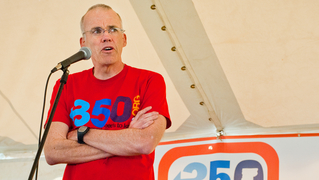
We continue our interview with ousted Maldives President Mohamed Nasheed and ask him if he plans to seek office again. “I will contest the coming elections,” Nasheed says, noting that, “if the coup was so popular, we would have seen people coming out, rejoicing with the military.” Instead, thousands of residents have been protesting against the coup and calling for early elections. Nasheed says he hopes the United States will support their call. The coup became news across the globe in part because Nasheed had become an internationally recognized leader on climate issues as he urged the world to do more to save small island states from rising sea waters. Watch Democracy Now! on Friday for more of this interview. Click here to watch Part 1 of the discussion with Nasheed and Jon Shenk, director of The Island President, a new documentary about his climate activism.
AMY GOODMAN: The tiny Indian Ocean state of Maldives remains in a state of political turmoil seven weeks after the country’s first democratically elected president, Mohamed Nasheed, was ousted in what has been described as a coup at gunpoint.
In 2008, Mohamed Nasheed beat the longtime ruler of the Maldives, Maumoon Abdul Gayoom, in the country’s first free and open election. Prior to the vote, Nasheed was a longtime pro-democracy activist who was jailed for six years. At the time, he was described as the “Mandela of the Maldives.” Nasheed now insists the February 7th coup was led by supporters of the former dictator.
The coup became news across the globe in part because President Nasheed has become an internationally recognized leader on climate issues, as he urged the world to do more to save small island states from rising sea waters.
We’re joined in the studio for part two of our conversation with the ousted Maldives president, Mohamed Nasheed, as well as Jon Shenk, a filmmaker who made a film about the Maldives and about President Nasheed called The Island President.
President Nasheed, you are now in New York, though you will head back to the Maldives. After your ouster, do you plan to attempt to become president again of the Maldives?
MOHAMED NASHEED: We feel that it is very, very important that we have elections as quickly as possible. In such an election, I would seek the primaries of my own party to become a candidate, and I hope that I do become. And then, yes, I will contest the coming elections. And we feel that the people of the country are very solidly behind us. Now, if the coup—if we were so unpopular and the coup was so popular, we would have seen people coming out, rejoicing with the military, and, you know, shaking their hands or doing something to the military. But we didn’t see any of those things. What we actually saw was thousands and thousands of people supporting us, coming out on the streets. In fact, for the last seven weeks, the whole of the Maldives has been out on the streets protesting against the coup and calling for early elections. But it’s just the military and the police holding it on. And we would hope that the international community would understand this. And we would hope that the United States government and the Indian government would impress upon the regime the need for early elections.
JUAN GONZALEZ: Well, and you mentioned the vice president, who took over as coup—the coup caretaker. Waheed Hassan Manik recently appeared on the BBC. He became president of the Maldives after the coup. He has rejected calls for quick elections.
PRESIDENT MOHAMED WAHEED HASSAN MANIK: I don’t believe that we can have a free and fair election immediately, because, as you know, the supporters of Mr. Nasheed do not believe in any institutions of government except for parliament. Even parliament, they are currently refusing to open.
JUAN GONZALEZ: What about this? He initially said that there would be quick elections, and now he’s backtracking.
MOHAMED NASHEED: Yes. Now they’re saying that the elections commission doesn’t have the capacity to run an election. Now, the American government also feels that the election commission doesn’t have the capacity to run an election. But we had a free and fair election in 2008, and everyone said it was free and fair. And—
AMY GOODMAN: How long were you elected for?
MOHAMED NASHEED: Five years. And everyone said it was free and fair, and including the American government. We had a free and fair parliamentary election in 2009. Again, everyone, including the U.S. government, decided it was free and fair. We had local government elections in 2011, and again it was declared free and fair. It’s very strange to see, to come to understand, why the elections commission is suddenly lacking capacity, and they won’t be able to have an election now. They have, in many instances, come out. The elections commission said that they can have an election any minute that we want.
AMY GOODMAN: And yet, they’re threatening you with bringing charges against you? What would those charges be?
MOHAMED NASHEED: Well, they would always want to make sure that I am unable to seek election again, and therefore, they would try to disqualify me, and they would come up with charges that would allow them to do that. Given that the judiciary is full of Gayoom hand-picked judges, and given that the police and the military runs the country now, it would be very, very difficult for me to remain without charges. But I hope that we will be able to fairly have a free and fair election and then reinstate democracy back again.











Media Options